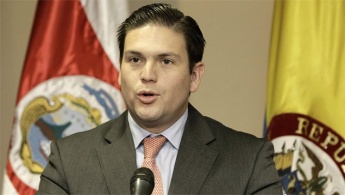Colombia Signs Cooperation Memorandum with NATO

Photo: Colombian defence minister Juan Pinzon (EFE)
Mérida – Yesterday representatives of Colombia and the North Atlantic Treaty Organisation (NATO) signed an agreement for cooperation and exchange of classified information, “good practice” in the “anti-terrorist” struggle, and against drug trafficking.
According to NATO spokesperson, Carmen Romero, speaking to EFE, the agreement “doesn’t make Colombia a partner [member] of NATO, but is rather about cooperation around common interests”.
Colombian defence minister, Juan Pinzon, and vice-secretary general of NATO, Alexander Vershbow, were in charge of signing the memorandum in Brussels, Belgium, where NATO’s headquarters are situated.
According to Telesur, the memorandum is the second official dealing between Colombia and NATO, as the Colombian Air Force trained in May this year with NATO planes in Canada.
Technically, Colombia can’t become a member of NATO, as only countries in the North Atlantic can join, but in the past many countries have become participants in its “Partnership for Peace” and in dialogue programs. Countries such as Australia and Japan are “global partners” of NATO.
Pinzon will also be travelling to France, the UK, and Spain. According to a Colombian government statement, the aim of his European tour is to “strengthen cooperation between the [Colombian] Armed Forces … with multilateral organisations in order to exchange experiences”.
The combined military budgets of all NATO members constitutes over 70% of global defence expenditure, and in recent years the organisation has waged wars in Afghanistan, Iraq, and Libya. The Colombian army meanwhile was responsible last year for 20 cases of “false positives”, involving 52 civilians being murdered, according to the Colombian Centre of Research and Popular Education (CINEP).
Colombia’s foreign minister, Maria Holguin, said that under the new agreement NATO would provide Colombia’s army with training “in human rights and good practices in the military forces”. Meanwhile, she said Colombia will provide NATO with the experience it has in “the fight against drug trafficking and organised crime, which we are seeing more in … the Sahel region of Africa, where NATO has some interest”.
France, with assistance from the US, Canada, and Europe, attacked Mali, in the Sahel region, in January, and Britain has sent troops there. According to the Canadian Peace Alliance, “The real reason for NATO’s involvement is to secure strategic, resource rich areas of Africa for the West. Canadian gold mining operations have significant holdings in Mali as do many other western nations”.
When first announced early this month, it was unclear what sort of relationship Colombia was seeking with NATO, with President Juan Santos talking of “joining” the organisation, but Pinzon ruling that out and speaking more of “cooperation”.
At the time, the Venezuelan government, as well as Ecuador, Bolivia, and Nicaragua, rejected Colombia’s possible membership of NATO, arguing that it would violate the peace treaties signed by member countries of the Union of South American Nations (Unasur), and would imply a “threat” of military intervention in the Americas.
Venezuelan ambassador to the OAS, Roy Chaderton said on Sunday that the relationship between Colombia and NATO is “irrational”, especially if “the advances in the region in terms of the integration of Unasur are taken into account”.

